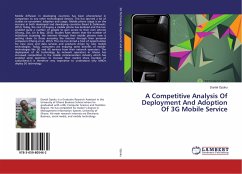More than 40% of Kenya's population depend on unimproved water sources and water and sanitation challenges are prominent in the informal settlements characterised by poor infrastructure of piped water. Deploying STI interventions can help residents of Nairobi City and the utility company (NCWSC) with more efficient, innovative, and profitable water services provision. This book documents assessment of the successes and challenges of deployment of STI in catalysing sustainable water services provision, water services infrastructure development, utilization and management and recommendations for possible adoption and uptake of the emerging innovations and technologies for improved and efficient management of water services provision. The main finding is that factual evidence in which STI infrastructure plans and deployments aligned to organizational and institutional visions do not always sometimes conform to situations and realities on the ground, especially by the final beneficiaries. The initiative has proved feasible for the informal settlement and can be enhanced by the deployment of STI enabled digital tools for existing public structures and institutions.
Bitte wählen Sie Ihr Anliegen aus.
Rechnungen
Retourenschein anfordern
Bestellstatus
Storno








